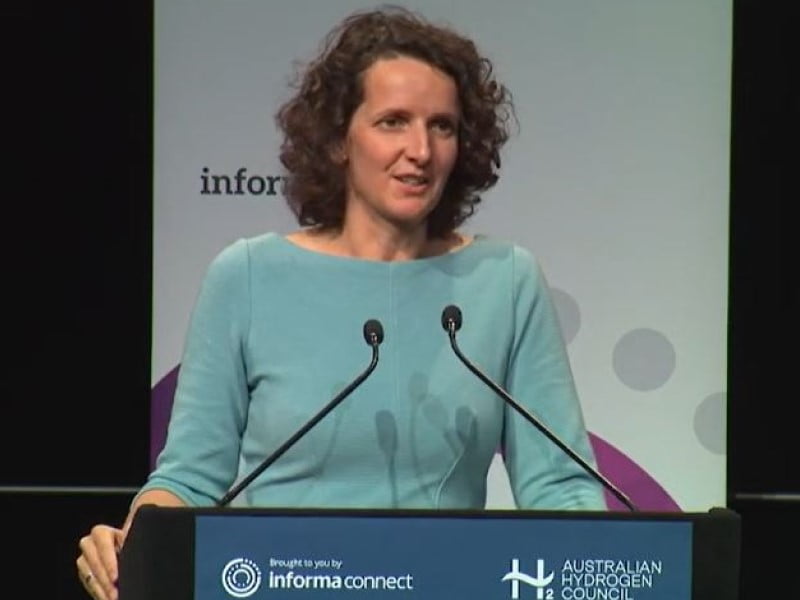After a week meeting industry and state governments across Australia, a German hydrogen delegate addressed attendees of the National Hydrogen Conference on Tuesday.
The 35-member delegation from Germany featured representatives from government, industry, and research, and met with the Western Australian, Queensland, New South Wales, and South Australian state governments before several members spoke at the Australian Hydrogen Conference in Adelaide.
The trip was organised as a part of HySupply, a hydrogen supply chain feasibility study between Australia and Germany, undertaken by a consortium based at the University of New South Wales and which received a $363,000 grant from the Department of Foreign Affairs and Trade in November 2020.

The German Minister for Education and Research Bettina Stark-Watzinger led the delegation, but did not participate in the South Australian leg of the trip.
German Innovation Commissioner for Green Hydrogen at the Federal Ministry for Education and Research Dr Stefan Kaufmann and Head of Division for Climate and Energy Cooperation with Industrialized Countries (Hydrogen Initiatives) at the Federal Ministry for Economic Affairs and Climate Action Dr Christine Falken-Grosser shared a keynote speech at the event.
Dr Kaufmann said the delegation’s tour had been successful and reiterated Germany’s commitment to collaborating with Australia on green hydrogen development.
“We had a wonderful time here in Australia. We not only experienced a lot of hospitality, but also a lot of commitment of the governments in several states, and also a lot of very concrete projects,” Dr Kaufmann said.
“The fact is that Germany will remain dependent on energy imports, our demand in 2030 is expected to be around 80 terawatt hours of green hydrogen or its derivates. We will be reliant on collaborations with countries which have more sun and wind than us, Australia in particular. At the same time, we also have something to offer: German plant engineer expertise, our electrolyser technologies, and also plenty of experience in renewable energy.”
Dr Falken-Grosser also noted that the European supply for renewables energy is insufficient to meet its needs.
“The problem is that the resources that we have for renewable energy in Germany are far too small, and also in Europe is too small. We’re trying to use our bilateral relationships [in Europe] to get more renewable energy in Germany to be used, but it’s never enough,” Dr Falken-Grosser said.
“We’ve experienced over the last few days a lot of interest and a lot of expectations from the Australian side towards the German government towards the German industry, and I can tell you the expectations are as high from our side.”
Following the keynote speech, a panel featuring three members of German industries took place. This included the Director General of the Federation of German Industries Holger Lösch, Thyssenkrupp Steel Europe program lead for energy and raw material Dr Bettina Hübschen, and H2 Global Advisory managing partner Timo Bollerhey.
Mr Lösch believes that Australia and Germany are early movers on hydrogen technology which puts them in a “very good position to jointly develop a future global hydrogen market”. He noted there remains a need for clear and consistent certification regarding the carbon footprint of green hydrogen, particularly as European companies must deal with carbon pricing. “We cannot build a global market on a colour scheme,” Mr Lösch said.
The German federal government anticipates that 90-110 terawatt hours will be needed by annually 2030 to help it reach its target for greenhouse gas neutrality by 2050. It anticipates producing 14 terawatt hours domestically by 2030 and has committed €2 billion in 2020 to form renewable energy trade partnerships in support of its Hydrogen Strategy.
The Commonwealth signed a ‘hydrogen accord’ with the German government in June 2021. Included in the accords is the German-Australian Hydrogen Innovation and Technology Incubator, or HyGATE, which aims to support pilot, trial, demonstration, and research projects in the hydrogen supply chain.
Australia set aside $50 million for this initiative while Germany set aside €50 million, or almost $75 million. Expressions of interest under the Australian Renewable Energy Agency administered first round of HyGATE close on June 9, 2022. Interested parties should apply here.
Do you know more? Contact James Riley via Email.

